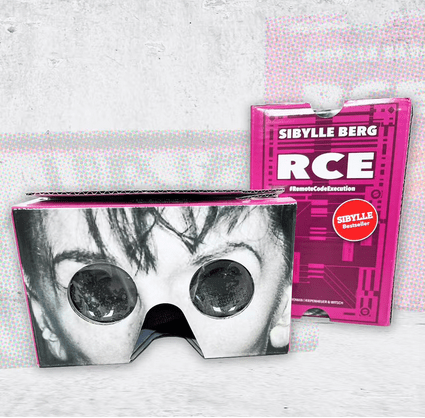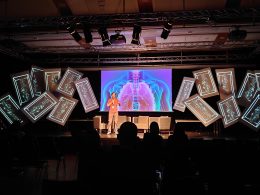Sibylle Berg's new novel "RCE. #RemoteCodeExecution" is now also an experience in 360°.
Literature has discovered virtual reality for itself. VR glasses transport readers into the middle of fantastic novel worlds. In this way, one becomes Berg's novel character who can no longer distinguish "between life on the net and real life". Sibylle Berg is not taking her new novel "RCE. #RemoteCodeExecution" not on a reading tour, but presents it, more suitable for nerds, as a virtual "performance" in the living rooms of her audience.
Sibylle Berg's new novel is nothing less than a plan to save the world. The best of all systems has helped a few to absurd wealth and deprived a great many of a dignified existence. The crisis the normal state of affairs: inflation, epidemics, natural disasters, dictators, wars. The situation seems hopeless. But five hackers have not given up yet.
You look past bags of chips at the screens of young female hackers. You become part of a glossy company and let people - if they haven't long since been replaced by avatars - in orange body suits spur you on to self-optimisation. Later, at the operating table, a big-breasted woman cuts open a body and exchanges intestines and heart for disks. The film lasts half an hour.
Literature becomes all-round entertainment
In classic films, the frame is set. On 360 degrees, however, the audience can look anywhere - even in the "wrong" direction. 360 degrees make it easy to look away - practical, for example, in the gruesome scene in the operating theatre.
In terms of design, the directing team around Sibylle Berg, and supported by the VR collective "Cyber Räuber", makes the most of what is technically possible. From the armchair or, even better, the swivelling office chair, there is a lot to discover around one's own axis, the surprise is literally on the back of one's neck. And those who look down will even find themselves in a new, at least well-fed, body in an ill-fitting suit.
Viewed through VR glasses, a narrative detaches itself from its linear sequence and is more of a spatial experience, more of an atmospheric impression than a dramaturgically complex chronology.
The scenes around you are prominently cast with Katja Riemann, Olli Schulz and Faber. And of course Sibylle Berg herself reads.
Sibylle Berg is not the first to carry literature into virtual reality. A project by the media artist Sarah Elena Müller, which we reported on in 2020, made Ilse Aichinger's "My language and me" a poetic dreamscape and also Klaus Merz's "Go" is available in 360 degrees, as our report shows.
Source: Sibylle Berg / bzbasel / Youtube









